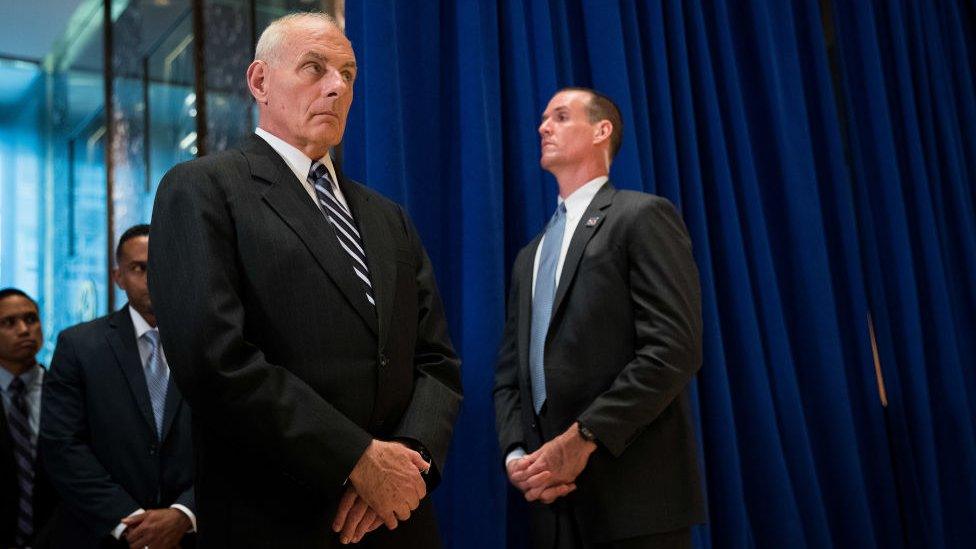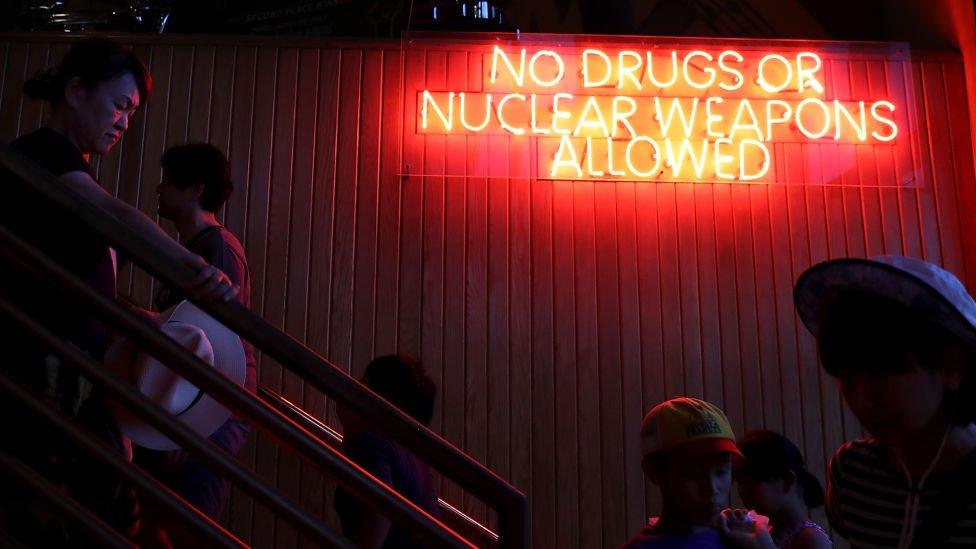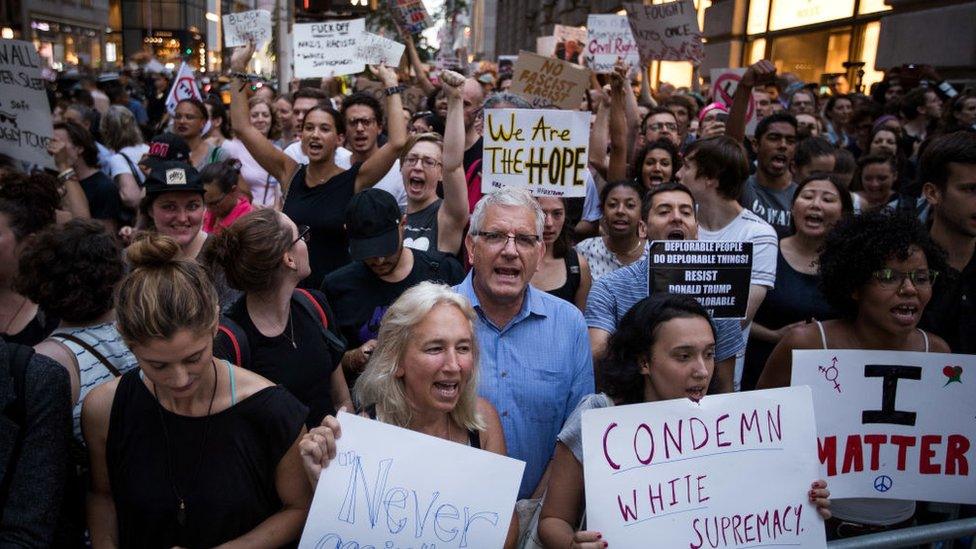A White House meltdown in the making
- Published

At some point during the campaign last year, most Republicans came to the conclusion that Donald Trump was like nuclear energy. His was a force that, if properly harnessed, could power their party for a generation.
And so the party embraced Mr Trump. Republican functionaries like Reince Priebus and Sean Spicer joined the White House team. The nuclear dragon would be tamed.
But after nearly seven months the depth of their miscalculation may be growing too obvious to ignore.
Without adequate controls, everything Mr Trump touches could end up radioactive.
"I think his ability to effectively govern is dwindling by the hour," CNN Jim Acosta quotes, external a Republican leadership source as saying.
Veteran reporter Carl Bernstein says, external that high-level Republican, conservative, and military officials are privately saying that Mr Trump is "unfit to be president".
As party officials stare at the glowing crater left from the president's latest meltdown, they are left wondering. What now? What next?
At least so far, many Republicans have opted for the path of least resistance. They make stern condemnations of white supremacists and the hate that motivated the violence in Charlottesville - in carefully worded statements and tweets - hoping it will provide political shelter from the ongoing storm.
'Amoral' president leaves world stunned
When it comes to taking aim at the president himself, however, Mr Trump is He Who Must Not Be Named. Their criticism is oblique and the condemnation implied. They may whisper uncomfortable views in private, but publicly they watch their words.
Speaker of the House Paul Ryan - who had plenty of experience distancing himself from Mr Trump during the campaign - provides a standard example of the manoeuvre.
"We must be clear," he tweets. "White supremacy is repulsive. This bigotry is counter to all this country stands for. There can be no moral ambiguity."
He then returned to tweeting about Republican tax policy.
Does Trump react to some hate crimes faster than others?
Contrast that to Virginia congressman Scott Taylor's words.
"Today's statements by President Trump at his press conference were disappointing and a failure of leadership, which starts at the top, with him," he said in a press release, external. "I hope the president will focus on bringing people together and to challenge hate in the strongest unequivocal terms moving forward. There is no home for hate here in Virginia or America."
Or Arizona Senator John McCain.
"There's no moral equivalency between racists and Americans standing up to defy hate and bigotry," he tweeted, external. "The president of the United States should say so."
Others are caught in a political whipsaw, alternating criticism and praise for a president who, once again, seems to change his administration's position based on pique or whim.
South Carolina Senator Lindsey Graham, for instance, called on Mr Trump to condemn white nationalists after his tepid response on Saturday and lauded his Monday scripted remarks by tweeting, external: "Well done Mr President".
On Tuesday it was back to blasting, external.
What Trump said versus what BBC journalists saw
According to a count, external by the liberal website ThinkProgress, just 14 other Republicans in Congress, out of 292, have made similarly explicit condemnations of the president so far.
Those who haven't put out any kind of statement, however, risk getting pressed by reporters for their take.
When one journalist asked, external Wisconsin Senator Ron Johnson what the president should say about the Charlottesville violence, he responded: "You tell me", adding that he wanted to move on.
That's a sentiment most Republicans probably share, but thanks to the president's combative press conference on Tuesday, "moving on" seems unlikely at least for now.
Within the administration officials are treading even more carefully. Chief of Staff John Kelly may have been caught by cameras repeatedly wincing during Tuesday's press conference, but he's back on the job today.

Trump's chief of staff glanced down at his feet throughout the Tuesday press conference
Gary Cohn - the president's top economic advisor who stood nearby as the president issued his remarks in Trump Tower - reportedly told friends he was "disgusted" and "upset" by the president's actions - but not so much that he would speak on the record.
Perhaps the reason why many Republicans are watching their words when it comes to the president is they have seen this film before.
During his presidential campaign, Mr Trump said undocumented Mexican migrants were criminals and rapists, he belittled Mr McCain's Vietnam War record, he insulted the parents of a Muslim US soldier killed in Iraq, he mocked a Hispanic beauty pageant contestant's weight, and a decade-old recorded emerged in which he boasted about using his celebrity status to sexually harass women.
After each of these episodes - and many more - Republicans eyed each other nervously and prepared to bolt for the exits, but Mr Trump eventually recovered. The storm passed, and in the end he prevailed.

A neon sign in Guam makes light of recent nuclear tensions with North Korea
"This too shall pass" isn't always a balm for the distraught. Sometimes it's a warning. It's a stern message for those who would doubt or abandon the president.
A HuffPost/YouGov poll, external conducted after the Charlottesville unrest (but before Mr Trump's Tuesday press conference) could also give clues as to why conservatives are taking pause.
Fully 77% of Trump voters think the president "did enough" to condemn white nationalist violence in Charlottesville. Two-thirds of them had no problem with the president's delay in mentioning neo-Nazis and white supremacists by name.
Perhaps most remarkably, 48% of Trump voters think the Charlottesville white nationalists either "have a point" (37%) or were "mostly right" (11%). And 68% of Trump voters see "a lot of discrimination" against white people in the US.

Protests raged outside Trump Tower during Trump's visit
Why draw the ire of a president known to keep close tabs on his friends and foes, Republicans may think, when the party's core voters largely still stand by his side, even through this latest political furore.
It's a calculation, however, that Mr Trump's corporate chieftans didn't have to make. After they abandoned the White House in growing numbers, the president was forced to announce his economic advisory boards were being shuttered.
Neither is political expediency a concern for much of the conservative media, which is showing growing signs of tiring of the presidential drama.
While some - like The National Review - have largely remained in the #neverTrump camp, the Federalist had often come to the president's defence. Until now.

"I don't think Trump is going to resign any time soon," says Robert Tracinski, a senior writer for the website. "But he needs to be left hanging out there all on his own without support from anyone in his party (or from anyone in the right-leaning media). He is a vortex of destruction, and the only way to survive is to get everything we love as far away from him as possible."
Mr Trump is a survivor. He outlasted all of his political opponents and bested many of his critics and naysayers. But a day of reckoning for Republicans could be fast approaching.
Follow Anthony Zurcher on Twitter, external.